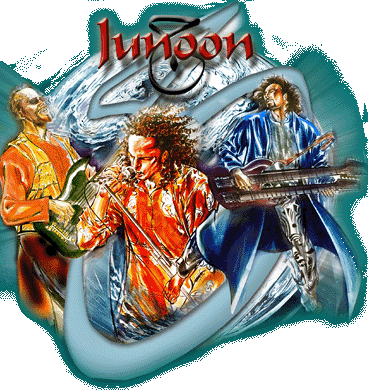Bob Marley showed that music could
transcend man-made frontiers. Until
Junoon sprang up in
1996, there was band in the sub-continent
comparable to Marley's Wailers
|
|

Feature
Redemption songs from an
impassioned band
A
political edge lifts Junoon above populist entertainment and
places it among the world's significant bands, writes Sreeram
Chaulia
Paani mein ek aag laga de ishq tera
Dekh mujhe paagal na bana de ishq tera
(Your love has the power to set water on fire, See how
insanity overtakes me in your love)
- Title track of Junooon's Ishq/Andaz (2001)
South Asia's cultural commonalities surpass artificial political
boundaries much more than outside observers can reckon. There
may be two Kashmirs, two Bengals and two Punjabs, divided on
grounds of religion and nationalism, but tastes for life and the
arts are remarkably similar for the man on the street, whether
he is in India, Pakistan, Afghanistan, Bangladesh, Nepal or Sri
Lanka. Nowhere is it truer than with popular music. Lata
Mangeshkar, Nusrat Fateh Ali Khan, Jagjit Singh, Mehdi Hassan
and Ghulam Ali belong to no individual nation-state because
their creativity and golden voices waft across borders like
fragrance, unstopped by armies and check-posts.
That music has the power to transcend man-made frontiers,
especially when it speaks the language of love, redemption and
tolerance, was demonstrated vividly by Bob Marley way back in
the 1970s. His call to shed mental slavery and love all humans
appealed not only in his native Caribbean but caught on like
wild fire in Africa, Europe and South America. Until 1996, South
Asia had no equivalent of Marley's Wailers that exclusively sang
and performed with the objective of uniting people under the
banner of redemption and brotherhood. A storm called Junoon
(Obsession/Passion) suddenly sprang up in Pakistan and filled
the vacuum, riding on fusion music and 'Sufi-pop' to the top of
the sub-continental charts, and more importantly, into the
hearts of young people.
Junoon's achievements are unique because they practically
invented a new genre of music, mixing spiritual poetry (rendered
in mellifluous voices and backed by traditional instruments like
the tabla and the dholak) with the electric guitar. Before their
arrival on the music scene, pop bands were seen as Western by
South Asian audiences. In this region, film soundtracks enjoyed
superlative popularity. Junoon brought in a change, with three
youthful and exuberant showmen, Ali Azmat, Salman Ahmed and
Brian O'Connell, equally at ease on stage and in the recording
studios. When a twenty-something Azmat leapt up and down in
Yanni-like hairdo and crooned with verve "Yaar bina dil
nahin lagta" (life without the beloved is empty), Bollywood
songs lost their monopoly grip, and Junoon's adulation spread at
an electric pace.
Junoon's first international album, Azadi (1997), sold
hundreds of thousands of copies and became an instant hit even
in the Middle East. One of the most memorable renditions in Azadi
was Allama Iqbal's classic Urdu poem, Khudi ko kar buland
itna (Strengthen your being). Purists wailed that the late
poet would be turning in his grave at the "rock-music
remix" that Junoon had done to his inspirational lyrics.
But fans loved it. As an undergraduate in Delhi University, I
used to close my eyes, turn on the volume full, and simply lose
consciousness as Junoon belted out songs on subjects as varied
as mysticism and standing up to oppression.
Traditional numbers like the Punjabi Dama dam mast qalandar
(Dance in joy, oh devotee) combined the ardour of a climaxing
qawwali with terrific Western beats. I recall dancing in circles
like the mad dervish who has found God. So did everyone touched
by Junoon, be it just to a tape recording or a live performance
by the 'awesome threesome.'
Junoon are heavily influenced in their choice of lyrics by
Jalaluddin Rumi, the occult Persian poet of the 13th century. In
beauty of nature or in the person of the loved one, Junoon hint
at the existence of a higher divine power. For instance, Mahiwaal
mere mujhe paar laga can at once be interpreted simply as
the love song of Sohni and Mahiwal, the Romeo and Juliet of
Punjab, or at a different level, a call by the mortal being to
the supernatural to come and guide him across the waters of the
world and reach up to the heavens.
Bulle Shah, the 17th century Sufi saint, is another Junoon
favourite. Parvaaz (1999) is dedicated to Bulle Shah's
life mission of moving beyond religion and loving each human as
a fragment of God. Pyaar bina kya bashar kya khuda
(Without love, what worth is man or God?) is the track that
captured listeners' attention most.
Besides winning accolades and a mountain of awards, Junoon have
the distinction of being the first pop group to perform at the
headquarters of the United Nations at its Millennium Peace
Concert. Guitarist Salman Ahmed is also a UN Goodwill Ambassador
assisting awareness campaigns on HIV Aids. More recently, Junoon
visited America in a spectacular concert tour that took cities
like New York by storm (bassist O'Connell is a native New
Yorker). They released their first ever English song -- 'No
More' -- a call to purge terrorism from Islam and to mourn the
victims of September 11. Azmat sang, "If all that lives is
born to die, love remains I wonder why..."
Junoon's views on political issues have drawn a great deal of
controversy in conservative Pakistan, with Nawaz Sharif's
government slapping a ban on them for allegedly making
"anti-Pakistan remarks" on a tour of India. Their
overt opposition to Pakistan's nuclear tests and governmental
corruption have also irked the powerful. Describing state
crackdowns on student activity and on minority Shias, Junoon
sang, Had se badhne laga zulm ka silsila (The cycle of
repression has gone beyond endurance). Elsewhere, they have
championed the causes of minorities by crying, Kaha jo unhon
ne sab ne suna, jo ham ne kaha, vo kis ne suna (What the
mighty say is aired to everyone, what we say is censored). All
the anger and frustration that idealistic South Asians face with
insensitive ruling elites is encapsulated in the lilting ditty Meri
aawaaz suno, mujhe aazaad karo, insaaf do (Listen to my
voice, free me, give me justice). Junoon has also warned
politicians and the wealthy from taking the masses for granted: Dharti
ke khuda karte hain jafa, inko do saza (Earthly gods oppress
us, let them be punished).
Very rarely has music in the subcontinent become a medium for
disseminating overt messages of harmony and equity. Junoon's
popularity in India is far greater than that of any previous
artiste from Pakistan. When they toured India, each of their
live concerts was sold out house-full. When they recently
performed at Cornell University in Ithaca, I found the majority
of the audience Indian. When Azmat broke out, Raasta jo aman
ka hain dhoond le hum (Let's search for the road leading to
peace), about 500 souls chanted in unison, and I closed my eyes
again in awe of the transcendental magic of Junoon. The other
day, I saw a television news report about the booming music
cassette industry in post-Taliban Kabul and sure enough,
Junoon's ever-popular Sayonee was playing loudly onto the
streets from a vendor's store! So rapidly has the group made
inroads into the South and West Asian market that Junoon fan
sites abound on the internet proclaiming they are 'Junoonies'
(the obsessed ones).
Western readers might not see a big deal in a pop group
attracting shrieking fans and crazy following, but this sort of
phenomenon has never occurred in South Asia. Before Junoon, all
the mass worshipping used to be the preserve of film stars and
cricketers, many of whom positively did not deserve that kind of
fawning attention. Drug abuse, match fixing and scandals have
taken the sheen off the old icons. The new icons present a
contrast with fresh music, which blends the best of East and
West, and an accompanying attitude dipped in human values. At a
time when South Asians struggle to live free from terrorism,
misrule and poverty, Junoon are the purveyors of what biographer
Horace Campbell terms was Bob Marley's trade- "emancipatory
politics." They sing for peace, redemption and eternal hope
of a better tomorrow:
Ye dil kyon tumhaara itna be-yakeen hain
Aisa to nahin hain ke Sanwal nahin raha
(Why is this heart of yours bereft of belief?
After all, love has not ceased to be)
Sreeram Chaulia
(The author studied history at St Stephen's
College, Delhi, and took a Second BA in modern history at
University College, Oxford. He researched the BJP's foreign
policy at the London School of Economics and analysed the impact
of conflict on Afghan refugees at the Maxwell School of
Citizenship, Syracuse, NY. He is currently working with the
International Rescue Committee in New York. His personal website
is accessible at www.sreeramchaulia.com)
Published
on 3 February 2003
Write to the editor

|
|

